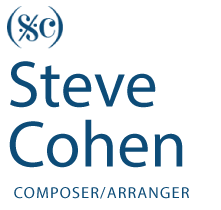24 July 2014 (REVISED: 12 Nov 2018)
A while ago, my friends at the Guild of Temple Musicians (GTM) asked me to share my thoughts on copyright compliance. I was happy to oblige them. The article seems to have been lost with the GTM updated its website, so the text of the article appears below.
Copyright Compliance: Do the Right Thing!
“Thou shalt not steal.” – Exodus 20:15
These words, along with the rest of the Ten Commandments, adorn the sanctuaries of most of our temples and synagogues. These are words that all of us surely take to heart. Yet many of us, perhaps unwittingly, may be committing theft regularly by the illegal photocopying of music.
How do we follow the copyright laws? What ARE the copyright laws? That's what we're here to discuss.
First off, it's important to know that these casual thefts are not victimless crimes.
Buying one copy of a choral work and then reproducing photocopies of it to distribute to a choir cheats the composer out of royalty payments, which are based on the number of copies sold. The publisher is also cheated, and this can result in higher prices, and fewer selections in the publisher’s catalog. Most American publishers are reporting sharp declines in the sales of printed music. They’ll surely be forced out of business if this trend continues.
I think we can all agree that music adds immeasurably to the worship experience and to the strength of the congregation when they are united in song. Therefore it is in the best interest of all of us – musicians, clergy and congregation – to do all we can to keep the sources of our music from drying up.
Copyright means the right to copy. By law, the right to copy music is reserved to the copyright holders, usually composers or publishers, and it is up to the rest of us to respect and abide by that right. Be sure that all the people who make music at your synagogue – cantors, choir, instrumentalists – are reading from legal copies of the music. Of course, special circumstances will arise occasionally (see below for some examples), and some instances of copying are permissible. Always ask yourself if the copy you’re about to make is being made to avoid paying for a legal copy; if the answer is yes, what you’re about to do is probably illegal.
With advances in technology, illegal sharing of all sorts of media has become much easier. That doesn’t make it right. Let your conscience be your guide, and, if necessary, let yourself be the guide of your congregation’s conscience.
If you feel you have a special circumstance, the best way to deal with it legally and ethically is to seek out the copyright holder and ask for help in solving the problem. Most publishers have a “go-to” person for this sort of thing. Composers who self-publish are especially approachable.
Many of us pride ourselves on “going green” to protect the environment. This is good and laudable. The same fervor should also apply to respecting and observing the intellectual property rights of the creators of the music that inspires us to worship.
Frequently Asked Questions:
Q: May I make a copy to eliminate page turns?
A: As long as you only make one copy for each page you have already paid for.
Q: May I enlarge music for those with vision issues (including myself)?
A: Same as above or secure a reprint license from publisher.
Q: May I make extra copies for singers who left music at home?
A: Not legally. Order a few extra copies, when you first acquire the music. Inform choristers they are responsible for returning music, and that they may be charged for what they lost and haven’t returned.
Q: If I see a song I like in an anthology, may I copy it to give to my accompanist?
A: You shouldn’t. You should have two legally purchased copies, one for the soloist and one for the accompanist.
Q: What if I wanted to do the aforementioned anthology selection with a choir? My budget won’t allow me to buy that many copies of the book.
A: This is your cue to get in touch with the copyright holder and request a license to reprint. Explain your situation, and – in most cases – the copyright owner will custom-fit you with a solution.
Resources:
COPYRIGHT LAW INFORMATION: http://www.copyright.gov/title17/
FAQ (Music Publishers Association): http://www.mpaonline.org.uk/FAQ
URJ BOOKS AND MUSIC: http://www.transcontinentalmusic.com/
CANTORS ASSEMB LY: http://www.cantors.org/
TARA PUBLICATIONS: http://www.jewishmusic.com/
OY SONGS: http://www.oysongs.com/
